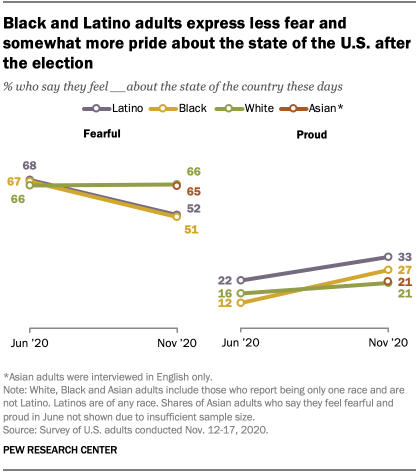In the weeks after the Nov. 3 election, the share of Black and Latino adults who say they feel angry about the state of the country has been sharply lower than in June, while feelings of hope have increased, according to a Pew Research Center survey.
Meanwhile, the feelings of White adults about the state of the nation have changed less. A majority remain angry, and the share who are hopeful is little changed since summer.
Fewer than half of Black (41%) and Latino (44%) adults now say they are angry about the state of the country, a substantial drop from the 72% and 67%, respectively, who said the same in June. White adults also showed a smaller drop since June, from 72% to 59%. Meanwhile, about half of Asians (51%) say as of November that they are angry about the state of the country (the share of Asian adults who said they felt angry in June is not shown due to insufficient sample size).
To understand the views of voters across key demographic groups about the state of the country after the presidential election, we surveyed 11,818 U.S. adults, including 10,399 U.S. citizens who reported having voted in the presidential election, between Nov. 12-17, 2020. Everyone who took part is a member of Pew Research Center’s American Trends Panel (ATP), an online survey panel that is recruited through national, random sampling of residential addresses. This way nearly all U.S. adults have a chance of selection. The survey is weighted to be representative of the U.S. adult population by gender, race, ethnicity, partisan affiliation, education and other categories. Read more about the ATP’s methodology.
Here are the questions used for this report, along with responses, and its methodology.
In June, similar shares of Black, Latino and White adults said they were hopeful, but that changed by November. Half (50%) of Latinos, 48% of Blacks and 45% of Whites described themselves in June as hopeful about the state of the country. In November, that gap widened, with 64% of Black and Latino adults expressing hope compared with 50% of Whites. In addition, about half of Asian adults (54%) say they are hopeful.
These shifts in feelings about the state of the country follow an election in which a record number of votes were cast and the turnout rate among eligible voters reached its highest level in more than a century. Supporters of both candidates experienced shifts in how they feel about the state of the country compared with June. More who say they voted for Joe Biden now say they feel hopeful about the state of the nation than was the case among registered voters who supported Biden in June, while fewer Trump supporters now say they are hopeful.
Among Latinos, the partisan divide on views of the state of the country reflects that of the U.S. population overall. The share of Latinos who say they feel hopeful among those who identify as Democratic or lean toward the Democratic Party has increased from 47% in June to 72% in November. By contrast, among Latino Republicans and Republican leaners, the share declined from 63% in June to 47% in November.
Overall, Latino and Black adults are now less likely to say they are fearful about the state of the country since June. Among both groups, about half of adults (52% of Latinos, 51% of Blacks) say they feel fearful, down from roughly two-thirds in June. Among White adults, 66% say they are fearful, unchanged compared with June. A similar share of Asian adults (65%) in November say they are fearful about the state of the nation.
In addition, Latino and Black adults are now more likely than White adults to say they feel proud about the state of the country, although among all groups only a third or fewer share that sentiment.
Note: Here are the questions used for this report, along with responses, and its methodology.





